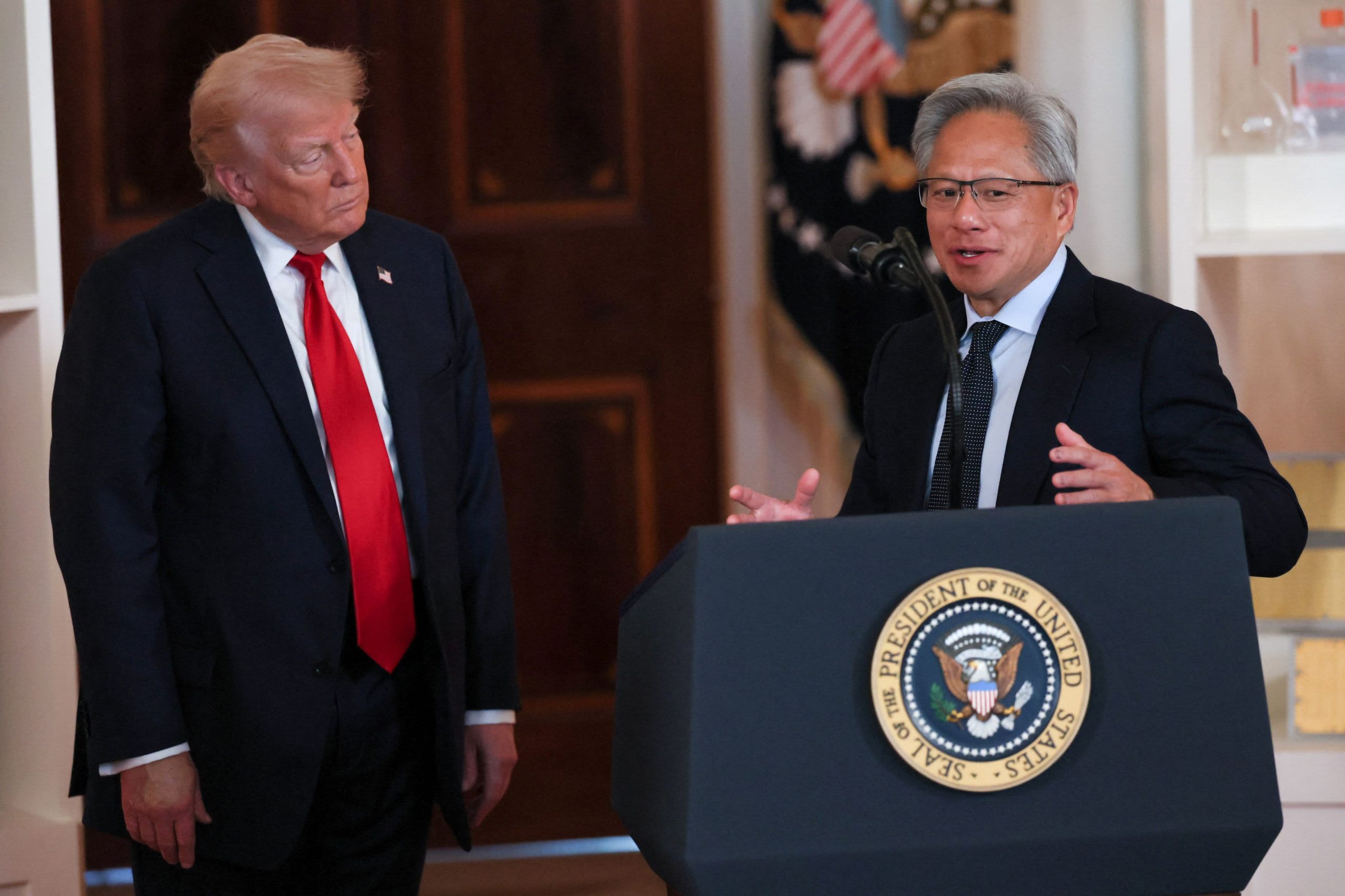Jensen Huang Just Declared an ‘AI Industrial Revolution’ — and He’s Not Backing Down From Trump or China
Nvidia’s stock surged Wednesday after CEO Jensen Huang dropped a flurry of bold claims — from warning the U.S. is falling behind China in AI power generation, to doubling down on his support for Donald Trump’s controversial $100,000 H-1B visa fee.
And if that wasn’t enough, he also took a thinly veiled jab at AMD’s “clever” OpenAI deal — suggesting the AI arms race is only just heating up.
‘Two Exponentials’ Are Colliding: AI Demand Is Exploding
Speaking live on CNBC’s Squawk Box, Huang said the past six months have seen an “exponential” jump in AI computing demand as the technology evolves from answering simple questions to performing complex reasoning.
“This year, particularly the last six months, demand for computing has gone up substantially,” Huang said. “We now have two exponentials happening at the same time — exponential demand and exponential computing power.”
Nvidia’s shares jumped nearly 2% after the comments, pushing the Nasdaq higher and reaffirming its dominance in the AI chip market.
Huang pointed to Nvidia’s newest chip architecture, Blackwell, calling it “the beginning of a new industrial revolution.” Demand, he said, is “really, really high.”
The company recently committed $100 billion to OpenAI’s next-generation data center network — an investment that could power systems equivalent to 8 million U.S. homes.
Huang’s Warning: America Is Falling Behind China
Despite Nvidia’s record-breaking market cap of $4.5 trillion, Huang issued a stark warning about the U.S. energy grid. He argued that without urgent investment in power generation, the country could lose its AI edge to China — which he says is “way ahead” in building energy capacity.
“The U.S. is not far ahead of China right now,” Huang said. “China is way ahead on energy.”
He urged the U.S. to build AI-dedicated power plants, powered initially by natural gas and eventually by nuclear energy, allowing data centers to operate independently of the public grid.
“We should invest in just about every possible way of generating energy,” Huang said. “Data center self-generated power could move a lot faster than putting it on the grid.”
Backing Trump’s $100K Visa Fees — With a Catch
In an internal message to staff viewed by Business Insider, Huang confirmed that Nvidia will continue sponsoring H-1B visas and will pay the new $100,000 application fees imposed by President Trump’s executive order.
“As one of many immigrants at Nvidia, I know that the opportunities we’ve found in America have profoundly shaped our lives,” Huang wrote. “The miracle of Nvidia — built by all of you, and by brilliant colleagues around the world — would not be possible without immigration.”
While he said he was “glad” to see Trump’s reforms, Huang acknowledged on the BG2 Pod podcast that the steep fee “probably sets the bar a little too high,” especially for smaller startups.
Critics argue the policy could push innovation offshore, as startups unable to pay the fees relocate talent abroad. But for Nvidia, which had over 1,500 H-1B approvals in 2025, the change is a manageable cost in exchange for retaining global talent.
The AMD-OpenAI Curveball: A ‘Clever’ But Risky Move
Huang also addressed AMD’s unexpected 10% equity deal with OpenAI, which has raised eyebrows across Silicon Valley.
When asked about the partnership, Huang smirked, calling it “clever” — but also suggesting AMD may have traded away too much too soon.
“I was surprised they gave away 10% of the company,” he said. “It’s clever, but it comes at a cost.”
The remarks hint at Nvidia’s growing confidence that its chips will remain the default foundation of the AI era, even as competitors scramble for relevance.
What’s Next: The $10 Trillion AI Power Grab
Analysts now believe Huang’s comments signal a massive buildout phase for the AI economy — one where computing power, not data, becomes the new oil.
OpenAI’s plan for 10 gigawatts of Nvidia-powered data centers is just the start. If the U.S. fails to match China’s pace in energy infrastructure, experts warn, American AI dominance could vanish within the decade.
For Huang, the stakes are existential:
“We’re at the beginning of a new industrial revolution,” he said. “Those who can build, power, and scale AI — they’ll define the next hundred years.”
Nvidia FAQ's
How much is Nvidia worth now?
As of October 2025, Nvidia’s market capitalization hovers around $4.58 trillion, making it one of the world’s most valuable companies.
What is Nvidia’s Blackwell chip?
Blackwell is Nvidia’s latest GPU architecture, designed to accelerate AI training and reasoning. It’s the successor to Hopper and expected to dominate next-generation data centers.
Why did Nvidia back Trump’s visa fee increase?
CEO Jensen Huang, himself an immigrant, believes legal immigration remains vital for U.S. innovation. Nvidia will cover all visa costs for its employees.
Who’s winning the AI race: the U.S. or China?
Huang says the U.S. is “not far ahead” and warns that China’s faster energy expansion could shift the balance of power in the AI arms race.














